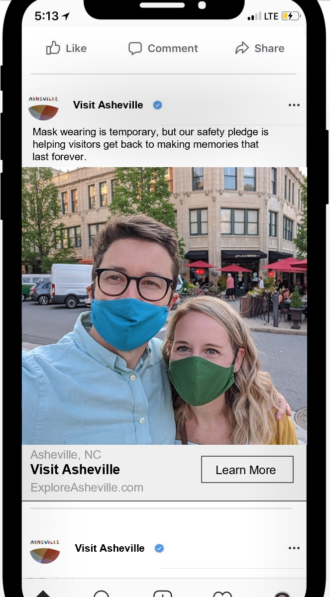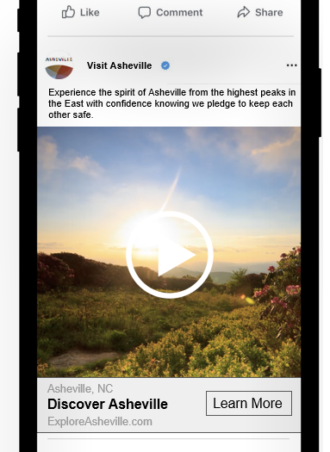By Sally Kestin, AVL Watchdog
Buncombe County’s Tourism Development Authority began advertising for tourists to visit Asheville again — on the same day that the county’s top public health official said coronavirus cases were “rising at an alarming rate.”
The ad campaign, designed to promote “the safe and responsible return of visitation,” featured social media posts like one picturing a young couple picnicking on the bank of a river. “We invite you to pack your bags and masks, and safely experience our mountain oasis.”
On July 14, just five days after the ads began, the TDA pulled the plug. The reason: a viral surge — both of the pandemic kind and of a social media variety.
The TDA had planned for the first scenario, monitoring COVID-19 trends in the target area, a 300-mile radius considered drivable to Asheville. When the campaign launched, large metropolitan areas like Charlotte and Atlanta were excluded because of a high viral caseload. But by mid-July, half of all the target counties had exceeded a threshold the TDA set and were considered coronavirus “hot spots,” according to documents obtained by AVL Watchdog through a public records request.
The second outcome had not been anticipated. “While all of our digital messaging communicated the importance of mask-wearing and social distancing, these messages also sometimes turned into sad platforms on social media for people to debate the wisdom of mask wearing,” Chris Cavanaugh, interim executive of the TDA, wrote to the board on July 15.
The debates, he said, had sometimes turned ugly.
“It had nothing to do with Asheville but was a sign of a larger unfortunate discussion taking place on a national basis,” Cavanaugh said in an interview Tuesday. “It’s sad, but that’s unfortunately the way people are on social media these days.”
Like other tourist destinations, Asheville is in a quandary. The stay-home orders are lifted, and many businesses are open, or partially open, but struggling mightily. Visitors can bring a needed boost — and they can bring more disease.
Nearby areas that were within the TDA advertising zone have seen some of the fastest-rising caseloads. Tennessee, South Carolina and Georgia are in the top 10 states with the most cases per 100,000 residents in the past week, according to a New York Times analysis.
“It is an issue that a lot of destinations are wrestling with,” Cavanaugh said. “Some have made the decision to go back into the market with TV advertising. I’ve seen ads for Pigeon Forge and Myrtle Beach.”
The TDA opted for ads on Facebook, Instagram and other social media platforms, targeting prospective visitors who had expressed statements suggesting they obey rules and would be “more likely to follow requested precautions, such as wearing a face covering,” a TDA document says.

The digital-only campaign allowed “the greatest amount of flexibility to pull advertising” quickly, Cavanaugh said. And that became necessary as new cases surged in neighboring states and Florida, a main source of summer visitors.
“There just literally became no places we could advertise,” Cavanaugh said. “There just weren’t enough counties that we considered safe that we could target.”
Julie Mayfield, an Asheville City Council member and nonvoting member of the TDA board, questioned the wisdom of advertising for tourists when the board heard the proposal in June.
“I am certainly glad that we have stopped advertising and I wouldn’t be opposed to doing more to discourage visitors from coming here,” she wrote in an email to AVL Watchdog. “I know people are desperate to get out of their hometowns and that we provide a great destination, and I know that our businesses and workers want to get back to work, but I am concerned about the rise in cases.”
Buncombe County Commission Chair Brownie Newman said he was aware of the TDA’s campaign and supported the decision to end it based on the data.
“I’m not that concerned about people staying in hotels per se,” he said. “It’s more people just coming into the region and going out into the public sphere — restaurants, other places where there’s a lot more interaction directly with members of the community, and that that could be a source of spread.”
Newman acknowledged local job losses from the pandemic number in the thousands.
“We’re very worried about those folks, so if the [coronavirus] numbers weren’t increasing, then that’d be great,” he said. “But they are going up.”
The TDA consulted with Newman and other government representatives about the ad campaign, said TDA spokesperson Kathi Petersen. “They understood, agreed, and approved of these plans,” she said.
The discussions included public health officials. “Our emphasis was that any TDA marketing should emphasize the continued threat of the pandemic and need for visitors to adhere to state and local guidance,” said Stacey Wood, spokesperson for Buncombe County Health and Human Services.
More like ‘PSAs’
The TDA controls the 6% occupancy tax revenue that comes from hotel and lodging stays. Its mission is to promote tourism to boost the local economy.
The TDA stopped advertising when the pandemic began and in May launched an online video, “Together in Spirit,” aimed to “inspire future travel, but without a call to action,” according to a July 2 marketing plan.
The short-lived social media campaign this month was meant to be a blend of “inspiration and safety,” according to the marketing plan. With research showing travelers seeking uncrowded places, the ads featured outdoor scenes and activities that allowed for social distancing.

Above one masked couple outside the Grove Arcade, the caption read: “Mask wearing is temporary, but our safety pledge is helping visitors get back to making memories that last forever.”
The ads emphasized safety “and could actually be described as ‘PSAs’ [Public Service Announcements] versus advertising,” Petersen told AVL Watchdog at the time of the launch. She defended the decision to advertise again, saying tourists are key to the city’s recovery and the survival of its small, independent businesses.
Government has stepped in with loans and assistance, including the $5 million Buncombe Tourism Jobs Recovery Fund that the TDA created to help local businesses. “But in the end, they will also need customers, more than just local residents, who will put cash in their registers,” Petersen said.
Cavanaugh said the TDA’s challenge is how to support local businesses that depend on high-volume summer sales to make it through the year without risking more infection.
“My big fear is what happens to these businesses once the colder months come, when the appeal of outdoor activities is a lot less, or when restaurants aren’t able to do outdoor dining?” he said. “What can we do to safely and responsibly invite customers for these businesses back into Asheville and help them during the time when hopefully they can earn enough income to ride out what may be a dark winter?”
With advertising on hiatus, the TDA is working with Buncombe County to erect signs in downtown, Biltmore Village and Black Mountain with reminders that masks are mandated.
“Wear a mask,” Cavanaugh said. “I can’t say that enough to anyone, whether they live here in Buncombe or are coming from Hawaii.”
The TDA plans to resume the ad campaign, though altered to avoid providing a platform for mask debates.
“I don’t know when we’ll be back,” Cavanaugh said. “It’ll probably be at least a month, but who knows?”
AVL Watchdog is a nonprofit news team producing stories that matter to Asheville and Buncombe County. Sally Kestin is a Pulitzer Prize-winning investigative reporter. Contact us at avlwatchdog@gmail.com.
"come" - Google News
July 29, 2020 at 04:17AM
https://ift.tt/3hNSPXU
From AVL Watchdog: Come back tourists; oops, never mind - Mountain Xpress
"come" - Google News
https://ift.tt/2S8UtrZ
Shoes Man Tutorial
Pos News Update
Meme Update
Korean Entertainment News
Japan News Update
Bagikan Berita Ini














0 Response to "From AVL Watchdog: Come back tourists; oops, never mind - Mountain Xpress"
Post a Comment